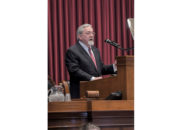JEFFERSON CITY, Mo. – The Missouri Supreme Court’s latest issued ruling is striking down provisions of a controversial municipal court reform law, SB 5.
While signing the bill into law, then Gov. Jay Nixon called it the “most sweeping” municipal court reform bill in state history. Now, it’s losing some of its effect.
The law, passed in 2015 following the fatal shooting of Michael Brown in August 2014, came about after the U.S. Department of Justice issued a report in March 2015, in which they slammed the Ferguson municipal courts as an “abusive fundraising tool,” highlighting how cities in St. Louis County came to rely on court fines and fees to provide revenue for services.
SB 5 sought to put an end to that, capping court revenue and imposing new requirements in an attempt to end what the bill’s sponsor, then-Sen. Eric Schmitt called predatory practices. SB 5 lowered the limit across the state for how much money could be generated from traffic fines and fees to be included in their general revenue. The previously allowed limit was 30 percent; SB 5 lowered that to 20 percent statewide, with one exception, which reads as follows:
“…any county with a charter form of government and with more than nine hundred fifty thousand inhabitants and any city, town, or village with boundaries found within such county shall be reduced from thirty percent to twelve and one-half percent.”
That didn’t sit well with several of the cities from the region, who challenged the law’s provisions aimed at St. Louis County, calling them “special laws” that are illegal under Missouri’s Constitution.
In the decision released on Tuesday, the Supreme Court, in their ruling, said they can safely presume the General Assembly knew when it passed SB 5 in 2015 that St. Louis County was the only charter county with a population more than 950,000 and because it has been the only county to meet the criteria since 1970.
They upheld the majority of the rulings made by Cole County Circuit Court Judge Jon Beetem, who had agreed with the plaintiffs in 2016, voting 5-1 with two judges not participating, but they also threw out portions of Beetem’s ruling, in particular, one that found certain requirements were illegal unfunded mandates barred by the state’s Hancock Amendment.
This, in effect, means that St. Louis County must be held to the same percentage limit as the rest of the state.
“After all, you don’t need a weatherman to know which way the wind blows,” Judge Zel M. Fischer wrote, channeling Bob Dylan’s Subterranean Homesick Blues.
The Supreme Court also struck down requirements that cities in St. Louis County have an accredited police department and certain levels of insurance, which implied that if they did not comply, they could face a takeover.

Now the state treasurer, Schmitt released a statement in response to the reform measures he championed during his time in the Senate.
“Prior to the passage of Senate Bill 5 in 2015, our state’s municipal court system, especially in the St. Louis region, was a safe haven for overgrown local governments that treated citizens like ATMs rather than trimming their budgets,” he said.
He did say that he found it interesting that the state decided to not present evidence, saying that he thought they had evidence aplenty and that it appeared to have weighed significantly on the outcome of the court’s ruling. He said that the need for municipal court reform was necessary because the alleged predatory practices “break down the trust of the people in their courts.”
“Although I am disappointed with the decision to create a flat revenue limit applied statewide, the court’s upholding of the majority of the law marks a significant victory for efforts to eliminate these abusive taxation by citation schemes that hit the poor especially hard.”
Schmitt also said that if you look at the reforms, they are vastly and largely still in place, and now include the non-moving violations put forward in 2016.
“It’s a statewide issue. Taxpayers should feel good about this, because we came together to fix it, and it’s already changed behaviors in some of these cities.”

Missouri State Auditor Nicole Galloway also issued a statement, saying:
“I am pleased the court has upheld my office’s ability to hold municipal governments accountable to citizens. Too often my audits have identified blatant disregard for financial reporting requirements and outright refusal to remit excess revenue owed to the state. My office will continue to aggressively hold cities accountable to ensure they are not using their courts as the main source of revenue to prop up an otherwise unsustainable government.”
You can read the Supreme Court’s decision by clicking here.
Benjamin Peters was a reporter for The Missouri Times and Missouri Times Magazine and also produced the #MoLeg Podcast. He joined The Missouri Times in 2016 after working as a sports editor and TV news producer in mid-Missouri. Benjamin is a graduate of Missouri State University in Springfield.











